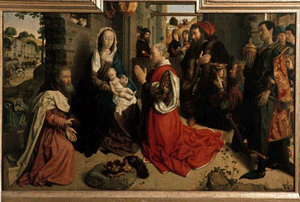This great collection of primary sources exemplifying the Early Modern European family is divided into several themes like: childhood, youth, sexuality, courtship, love, weddings, married life, and economic life. The authors (Chojnacka, Wiesner-Hanks) explain each primary source and discuss its context.
Woodcut of a young woman in love, Germany 1570
The young woman speaks
My heart is wounded
To the ground
By Cupid With his love-beam
Oh, I was his love
And was so constant
As he acknowledges
I was inclined to him,
But love's security
Often fails
And brings all kinds of danger
To morality and honor.
So – go away young man,
I won't answer you anymore.
(more)
The young woman speaks
At the beginning you declared
The power of firm love
And because you complained
I declared my love for you
But not any more.
Such is faithfulness, virtue and honor,
That now you have gone
'My loyal servant',
But you left.
Your uniting love has gone from here.
I will do the same.
I loved you alone
For all time.
In love there is sweetness
As long as God gives me life.
(Chojnacka, Wiesner-Hanks 100-101)
The authors contextualize this woodcut; "Young people in love were frequent subjects of woodcuts and engravings, which served either as illustrations for books and pamphlets or were printed as single sheets and sold by booksellers and peddlers" (Chojnacka, Wiesner-Hanks 100). The fact that woodcuts describing two young love birds were common suggests not only that young people often shared mutual adoration, but also the fact that this kind of love was normative, constructed by the German community of the time.
A daughter's letter to her father on her confirmation day, Germany 1778
"Today is one of the most important days in my whole life, because with God's support I will go into a confessional booth for the first time in my life, and afterward will be invited to the atonement and holy meal of our lord Jesus. So that I might appear in a more worth way, it is my duty and obligation as a child, to first appear before you my gracious father, with my thanks and debts…because my conscience is also convinced that I have often offended you my dear Papa both consciously and unconsciously, and have brought you to anger, so I will not only attest to this, but will ask you obediently with my whole soul to forgive me my youthful errors and sins from your heart. If you do not bear these in mind any more, I will attempt, with the help of God, to transforms these errors into virtues. I ask in closing only this, that you include me in your Christian and fatherly prayers, and ask for God's grace and help for me, to which God will undoubtedly listen. For this I will be, for the duration of my life, My gracious Herr Papa's humble and obedient daughter" (Chojnacka, Wiesner-Hanks 196-197).
This example illustrates the love and gratitude this daughter felt for her father during the time of her conformation. This source paints some historical continuity as many children in the contemporary west will often express their indebtedness to their parents during the time of a milestone in their lives.


